Equine therapy is a type of therapy that involves working with horses to improve mental and physical health. Horses are unique animals with abilities that make them ideal therapy animals. But there are several types of equine therapy, each with its own approach and benefits.
Equine-assisted therapy (EAT) is a type of therapy that uses the relationship between the client and the horse to promote growth and healing. EAT sessions are led by a suitably qualified professional and an experienced horse handler. Clients work with the therapist and horse to explore their emotions, thoughts, behaviours, and relationships.
In EAP, the horse’s unique behaviour and non-verbal communication style can provide valuable insights into the client’s thoughts, feelings, and behaviour patterns. For example, a client’s ability to interact with the horse, control their emotions and build trust can indicate their ability to handle similar situations in their daily life.
EAP can be helpful for individuals struggling with mental health conditions such as anxiety, depression, trauma, and addiction, as well as for those seeking personal growth and self-discovery.
EAP can also have several other titles, often depending on who the qualified session leader is: Equine-Assisted Psychotherapy (EAP) where the session leader is a qualified physiotherapist, Equine Facilitated Counselling (EFC) where the session leader is a counsellor, or Equine Facilitated Wellness (EFW) and Equine Facilitated Mental Health (EFMH) where the qualifications suit the mode of treatment.
Equine-Facilitated Psychotherapy (EFP) : Equine-Facilitated Psychotherapy (EFP) is a type of psychotherapy that uses the relationship between the client and horse as the primary therapeutic tool. EFP sessions are led by a licensed psychotherapist and an experienced horse handler. Clients work with the horse to develop trust, communication, and connection.
In EFP, the horse’s behaviour and non-verbal communication can provide valuable feedback to the client about their own behaviour and emotions. For example, the horse’s response to the client’s approach and touch can indicate the client’s level of comfort, assertiveness, and trust.
EFP can be helpful for individuals seeking personal growth, self-discovery, and improvement in their social skills and self-esteem. It can also be beneficial for individuals struggling with relationship issues, social anxiety, and low self-esteem.
Hippotherapy : Hippotherapy is a type of physical therapy that uses the horse’s movement to improve the client’s physical, emotional, and cognitive function. Hippotherapy sessions are led by a licensed physical therapist and an experienced horse handler.
In hippotherapy, the therapist uses the horse’s movement to challenge the client’s balance, coordination, strength, and motor skills. The horse’s three-dimensional movement can help to stimulate the client’s sensory, motor, and postural systems, leading to improved physical function.
Hippotherapy can be helpful for individuals with physical disabilities such as cerebral palsy, spinal cord injuries, traumatic brain injuries, and developmental delays. It can also be beneficial for individuals with conditions affecting the nervous system, such as multiple sclerosis and Parkinson’s disease.
Therapeutic Riding : Therapeutic riding is a type of equine-assisted therapy that involves riding a horse for therapeutic purposes. Therapeutic riding sessions should be led by a certified therapeutic riding instructor and an experienced horse handler.
In therapeutic riding, the therapist uses the horse’s movement to improve the client’s balance, coordination, strength, and motor skills. Riding a horse can also help to improve the client’s self-confidence, communication skills, and emotional resilience.
Therapeutic riding can be helpful for individuals with physical disabilities such as cerebral palsy, spinal cord injuries, traumatic brain injuries, and developmental delays. It can also be beneficial for individuals with conditions affecting the nervous system, such as multiple sclerosis and Parkinson’s disease, as well as for individuals seeking personal growth and improvement in their physical and emotional well-being.
In conclusion, each mode of equine therapy offers unique benefits and can be effective for different individuals. EAT and EFP focus on the emotional and psychological benefits of working with horses, while hippotherapy and therapeutic riding focus on physical rehabilitation. Ultimately, the best type of equine therapy will depend on the individual’s specific needs and goals.
Note: There are individuals and organisations that offer contact with horses under the label ‘therapy’, but in reality are more recreational. Any competent provider or equine therapy should be able to tell you which types of therapy they offer and who is undertaking it.
Here at Heartfelt Support, we have two types of equine therapy, our Equine Therapy programs align with EAT above and our Horse Centred Wellbeing program aligns with EFW. If you are in Adelaide and interested in either type you can apply here.

